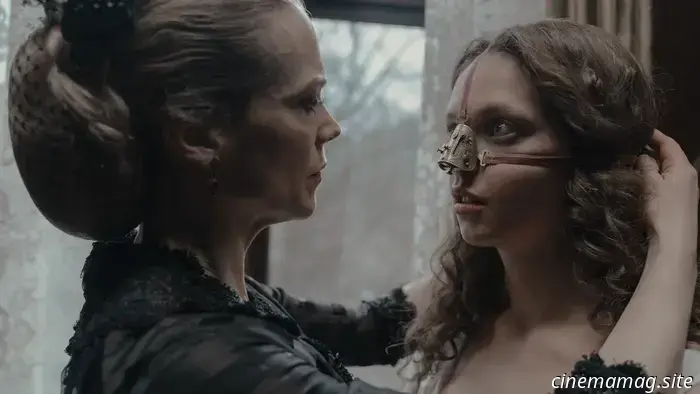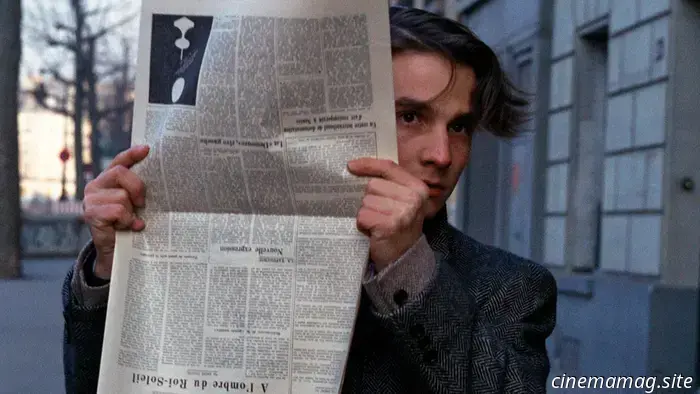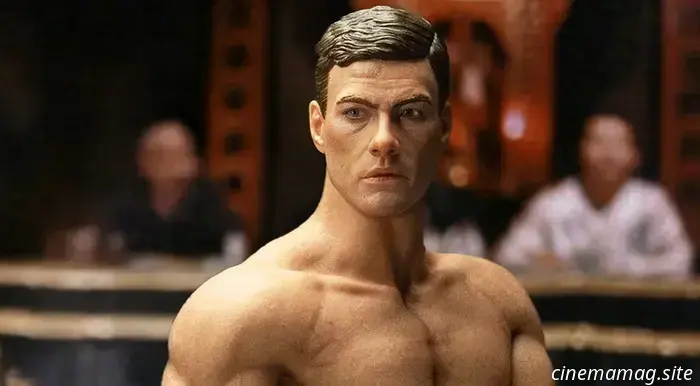
The Ugly Stepsister Review: Cinderella Receives a Gruesome and Empathetic Body Horror Reinterpretation
Note: This review was initially published as part of our 2025 Sundance coverage. The Ugly Stepsister is set to hit theaters on April 18.
In light of the discouraging lack of originality in Disney’s live-action remakes, which may suggest that these enduring stories have been exhausted, Norwegian director Emilie Blichfeldt breathes new life into the Cinderella narrative. Her strikingly crafted and darkly twisted debut feature follows Elvira (Lea Myren, making a remarkable feature debut) as she lives in the shadow of her stepsister Agnes (Thea Sofie Loch Naess) while they both compete for the attention of the Prince (Isac Calmroth). Offering a perverse body horror perspective on the classic tale, The Ugly Stepsister unflinchingly explores the sacrifices made for beauty, blending gruesome elements with a striking sense of empathy.
Blichfeldt draws inspiration from the Brothers Grimm version (which features a darker theme involving self-harm), distinguishing her work from the recent money-driven horror adaptations of Peter Pan and Winnie the Pooh through both its craftsmanship and emotional depth. Eager for the Prince's affections, which she glimpses in feverish dreams, Elvira is willing to go to great lengths, including altering her body to meet a specific beauty ideal, all motivated by her overbearing, newly widowed mother Rebekka (Ane Dahl Torp). Early scenes of pimple-popping and corrective “surgery” set the mood for physical torment involving eyes, toes, and stomachs, all in pursuit of happiness through a man's validation. Even the subtler body horror elements––such as a spaghetti-eating scene––evoke an unsettling atmosphere reminiscent of Joel Potrykus’ Buzzard. The quest for the grotesque isn't entirely new, as evidenced by the extreme scenarios found in the Oscar-nominated The Substance. However, where Coralie Fargeat's approach relied on overwhelming heavy-handed metaphors, Blichfeldt demonstrates a talent for structure and building tension. The climactic ballroom scene and the search for the true owner of the slipper create a visceral spectacle filled with discomfort, highlighting the desperate yearning for an embrace that remains out of reach.
By shifting the focus from Cinderella to her stepsister, Blichfeldt encourages the audience to empathize with a character historically portrayed as a villain. Myren is an ideal fit, effectively embodying both the fleeting joy and deep sorrow of pursuing unattainable beauty, all for the sake of winning over a man who is merely a symbol for her. Though lacking a fairy godmother, the closest figure is a sexist, misogynistic character who provides a dress for Elvira. At first glance, these adjustments may seem like a revisionist, feminist interpretation of a time-honored story, but beneath its richly twisted facade, The Ugly Stepsister conveys a sobering message about the stifling limitations of female independence portrayed across many classic fairytales. These narratives, repeated through generations, aim to entertain and inspire children from an early age.
Somewhat reminiscent of Sofia Coppola’s Marie Antoinette, thanks to Vilde Tuv and Kaada’s anachronistic score and the elegant cinematography by Marcel Zyskind (which beautifully showcases the Polish castle and costumes by Manon Rasmussen, a regular collaborator of Lars von Trier), The Ugly Stepsister avoids the stiffness often associated with period dramas. While Blichfeldt occasionally leans too heavily into the gruesome aspects, this is a skillfully crafted debut that commendably finds unexpected sympathy within the downtrodden and overlooked.
The Ugly Stepsister premiered at the 2025 Sundance Film Festival and will be released by IFC Films/Shudder.
Other articles
 The Criterion Collection's lineup for July features 4K releases from Stanley Kubrick, Fritz Lang, François Truffaut, and Kenneth Lonergan.
Criterion has revealed its lineup for July 2025, featuring two highly sought-after upgrades and the addition of a prominent American filmmaker to their collection. Stanley Kubrick's Barry Lyndon and François Truffaut's Antoine Doinel series— the former having been released in 2017 and the latter originating around the beginning of the second Iraq War—will be released in new 4K editions. While almost everyone has
The Criterion Collection's lineup for July features 4K releases from Stanley Kubrick, Fritz Lang, François Truffaut, and Kenneth Lonergan.
Criterion has revealed its lineup for July 2025, featuring two highly sought-after upgrades and the addition of a prominent American filmmaker to their collection. Stanley Kubrick's Barry Lyndon and François Truffaut's Antoine Doinel series— the former having been released in 2017 and the latter originating around the beginning of the second Iraq War—will be released in new 4K editions. While almost everyone has
 The lineup for the 2025 Tribeca Festival features films from Alex Ross Perry, Takashi Miike, RZA, and others.
The Tribeca Festival has announced its 2025 lineup in advance of the annual event scheduled for June 4-15. This year's selection includes Alex Ross Perry's Videoheaven, Takashi Miike's Shame, RZA's One Spoon of Chocolate, Hélène Cattet and Bruno Forzani's Reflection in a Dead Diamond, Kate Beecroft's East of Wall, among others. "At Tribeca, we hold the belief that storytelling serves as a powerful medium."
The lineup for the 2025 Tribeca Festival features films from Alex Ross Perry, Takashi Miike, RZA, and others.
The Tribeca Festival has announced its 2025 lineup in advance of the annual event scheduled for June 4-15. This year's selection includes Alex Ross Perry's Videoheaven, Takashi Miike's Shame, RZA's One Spoon of Chocolate, Hélène Cattet and Bruno Forzani's Reflection in a Dead Diamond, Kate Beecroft's East of Wall, among others. "At Tribeca, we hold the belief that storytelling serves as a powerful medium."
-Movie-Review.jpg) The Accountant 2 (2025) - Film Review
The Accountant 2, set to release in 2025, is directed by Gavin O'Connor and features a cast that includes Ben Affleck, Jon Bernthal, Cynthia Addai-Robinson, J.K. Simmons, Daniella Pineda, Alison Robertson, Robert Morgan, Grant Harvey, Andrew Howard, Matt Linton, Cassandra Blair, Nik Sanchez, John Patrick Jordan, Fernando Chien, Abner Lozano, Catherine Adell, Michael Tourek, and Monica Bhatnagar. SYNOPSIS: Christian Wolff utilizes his exceptional intellect and [...]
The Accountant 2 (2025) - Film Review
The Accountant 2, set to release in 2025, is directed by Gavin O'Connor and features a cast that includes Ben Affleck, Jon Bernthal, Cynthia Addai-Robinson, J.K. Simmons, Daniella Pineda, Alison Robertson, Robert Morgan, Grant Harvey, Andrew Howard, Matt Linton, Cassandra Blair, Nik Sanchez, John Patrick Jordan, Fernando Chien, Abner Lozano, Catherine Adell, Michael Tourek, and Monica Bhatnagar. SYNOPSIS: Christian Wolff utilizes his exceptional intellect and [...]
 Leonardo DiCaprio is ready for action in the promotional poster for Paul Thomas Anderson's One Battle After Another.
After the trailer's launch, Warner Bros. is intensifying the marketing efforts for their Paul Thomas Anderson-directed political drama One Battle After Another by unveiling two brand new posters for the high-budget film set to release in the fall. Penned and helmed by the creator of Liquorice Pizza and There Will Be Blood, One Battle After Another features […]
Leonardo DiCaprio is ready for action in the promotional poster for Paul Thomas Anderson's One Battle After Another.
After the trailer's launch, Warner Bros. is intensifying the marketing efforts for their Paul Thomas Anderson-directed political drama One Battle After Another by unveiling two brand new posters for the high-budget film set to release in the fall. Penned and helmed by the creator of Liquorice Pizza and There Will Be Blood, One Battle After Another features […]
 Final Destination: Bloodlines unveils a new poster.
Warner Bros. Pictures and New Line Cinema have unveiled an intense new poster for the upcoming installment of the horror series Final Destination: Bloodlines, featuring the Skyview restaurant being completely decimated; take a look here… SEE ALSO: Final Destination 25th Anniversary Retro Review: The Supernatural Slasher! The film is directed by Adam Stein & […]
Final Destination: Bloodlines unveils a new poster.
Warner Bros. Pictures and New Line Cinema have unveiled an intense new poster for the upcoming installment of the horror series Final Destination: Bloodlines, featuring the Skyview restaurant being completely decimated; take a look here… SEE ALSO: Final Destination 25th Anniversary Retro Review: The Supernatural Slasher! The film is directed by Adam Stein & […]
 Infinite Statue has revealed a collectible of Frank Dux from Jean-Claude Van Damme's Bloodsport.
Infinite Statue has revealed its forthcoming Frank Dux sixth scale figure, inspired by Jean-Claude Van Damme's appearance in the 1988 martial arts cult classic Bloodsport. Take a look at both the Standard and Deluxe Versions of this collectible below… SEE ALSO: Enter The Muscles from Brussels: The Jean-Claude Van Damme Tournament Fight […]
Infinite Statue has revealed a collectible of Frank Dux from Jean-Claude Van Damme's Bloodsport.
Infinite Statue has revealed its forthcoming Frank Dux sixth scale figure, inspired by Jean-Claude Van Damme's appearance in the 1988 martial arts cult classic Bloodsport. Take a look at both the Standard and Deluxe Versions of this collectible below… SEE ALSO: Enter The Muscles from Brussels: The Jean-Claude Van Damme Tournament Fight […]
The Ugly Stepsister Review: Cinderella Receives a Gruesome and Empathetic Body Horror Reinterpretation
Please note that this review was initially published as part of our coverage for Sundance 2025. The Ugly Stepsister is set to be released in theaters on April 18. If the disappointing absence of originality in Disney's live-action remakes leads you to believe that these classic tales have reached the end of their run, you can count on Norwegian director Emilie Blichfeldt to breathe new life into them.
